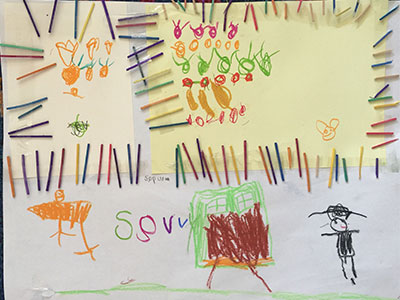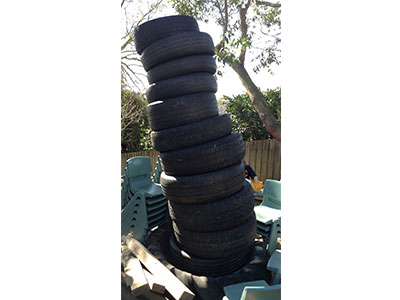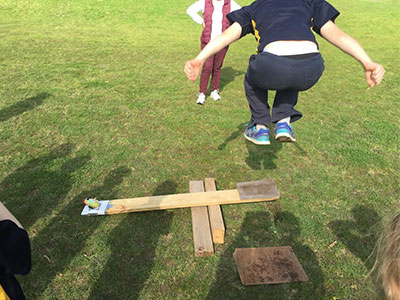Published 18 Jun 2019
How engaging relationships can spark learning in the classroom - Fish Creek District Primary School
Engaged students in learning
Kerri Smith
Prep Teacher, Fish Creek District Primary School
Kerri Smith is a recent winner at the 2018 Victorian Education Excellence Awards. Kerri was awarded Outstanding Primary Teacher of the year and demonstrates how maintaining fun relationships with her students creates a positive learning environment for all.
Engagement in the classroom is all about relationships, the most important being the one between a teacher and her students. John Hattie tells us that a positive teacher / student relationship has a 0.72 effect size. Mr Hattie also says that “it is teachers who have created positive teacher-student relationships that are more likely to have above average effects on student achievement.”
At the start of the year, my most important job is to get to know my students and find out what makes them tick, so that I can engage them in their own learning journey. I need to know about their lives beyond the school gate, as well as what motivates them to learn in my classroom. I need to know about their families, where they live, what groups they belong to out of school, what their favourite toys are etc.
We often talk about what happens in the brain when we are learning new things, so I introduced the “Learning Pit” where we discuss the power of ‘yet’. My students need to know that their brains won’t spark unless a task is a bit tricky for them. I tell them that I love to see them make mistakes because then I know their brains are firing and we have a great opportunity for learning to occur.
I discourage ‘hands up’ or calling out answers because my students know that it stops others from having a chance to think for themselves. They also know that if I call on them to answer a maths question, for example, then I am also going to ask them to prove that they are right.
I like James Nottingham's motto of: "I may not answer all of your questions, but I will question all of your answers."
"Humour is a constant feature in my classroom; if the students are smiling or laughing, then they are in a pretty good space."
My preps think it is funny when I call them Boris or Little Munchkin and they feign indignation when they ask me what I’m doing and I reply, “I’m riding a bike,” or “I’m trying to make a chocolate cake,” even though I am really just writing myself a note.
When we go swimming, I remind them that they are not allowed to get wet. When they go to Music and Drama, I tell them they are not allowed to have any fun. The silliness is a bond that we share and they pay it back to me over and over again.
I create fun games for my students to practise their skills.
Ya-hoo! Yabba-dabba-doo!
It's like Bingo, but coupled with a few arm movements, much laughter and a much more exciting catch phrase. They know I am not going to tell them how to spell a word unless they have had a go at it first. I don’t do for them what I know they can do for themselves.
Write and Wriggle
This is the game where we practice our ‘popcorn words’ (words that keep popping up in our reading and writing). The students sit around large pieces of paper and I give them a word to write. They spell it out loud as they write it, then race off to the next sheet and write it again as fast as they can. They keep going until I give them a new word. When we have finished, they scrunch up their scrap paper into a snowball and have one minute to throw their snowballs at the roof, before they line up and try to throw it into the recycle bin. We keep score with each throw; our best this year has been 16 out of 18 (never miss an opportunity to introduce fractions). The next time we play, we turn the paper into aeroplanes and try to land them in the bin. We’re not too good at this…yet!
You Be the Teacher
The students love it when the winner of our WOW! Board draw chooses ‘You Be the Teacher’ and I have to do their work for them while they teach the grade for 15 minutes.
"I invest time and effort into setting up play-based learning activities and STEM challenges because they engage kids."
My students love this time and their creative talents and teamwork really come to the fore.
When I told them last year’s preps managed to stack 11 tyres on top of each other, they dragged their chairs outside to stand on, collected planks of wood and managed to get another tyre on top.
We redesigned Mr McGregor’s garden so Peter Rabbit couldn’t steal his carrots and we made delicious playdough cakes and biscuits to sell in our bakery.
Our whole school turned potatoes into athletes and we launched them off a catapult in our Spud Olympics to see which spuds would fly the furthest.
So much learning happens through play, and engagement is not an issue because the kids are having fun.
After winning the Outstanding Primary Teacher Award this year, one of my colleagues asked my students what they thought of me. Most of their answers related to them thinking I was funny. “She calls us bananas!” “She pretends she can’t read.” “She is very funny because she calls me George, but I am not George, I’m Shelby!”
We have a lot of fun, but when it comes to the hard stuff, their little heads are down and their minds are firing. They are learning how to persevere, knowing that they will get it eventually; it might not be today, but one day it will all click into place.
In the meantime, we’ll keep playing “Ya-hoo! Yabba-dabba-doo!”
Read more about Kerri's journey and her VEEA winner profile here.



Do you have an example of outstanding work in your school or early childhood service? We’d like to consider showcasing it the Excellence in Teaching section of our website. Send your example and contact details to vitcomms@vit.vic.edu.au.
